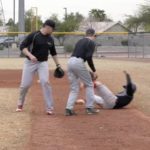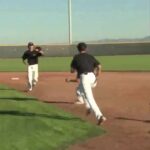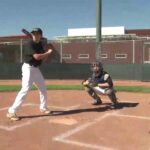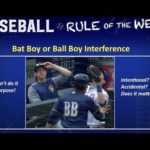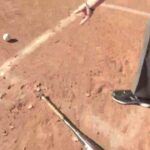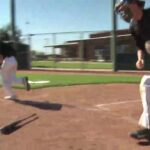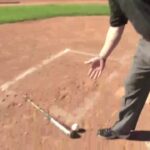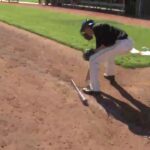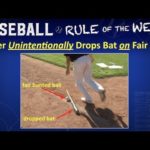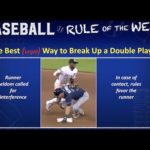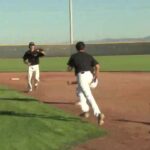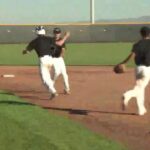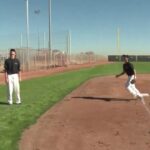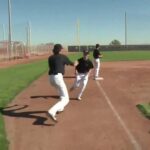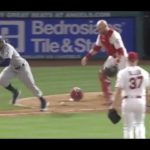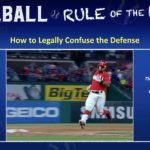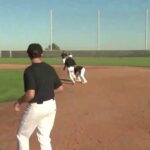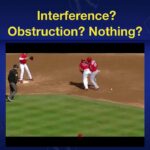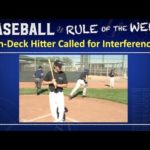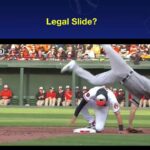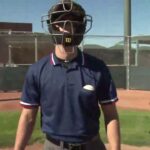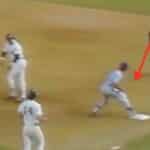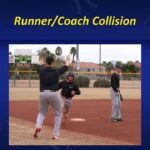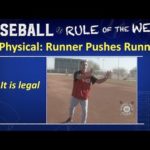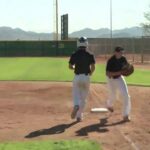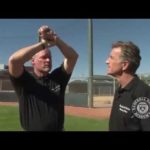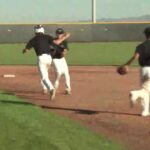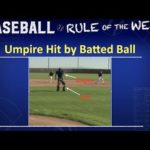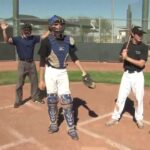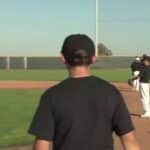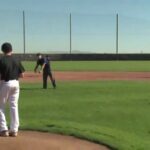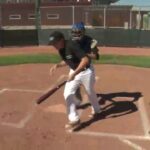7.09 Interference
It is interference by a batter or runner when –
(a) the batter hinders the catcher in an attempt to field the ball;
(b) the batter intentionally deflects the course of a foul ball in any manner;
(c) before two are out and a runner on third base, the batter hinders a fielder in making a play at home base; the runner is out;
(d) any member or members of the offensive team stand or gather around any base to which a runner is advancing, to confuse, hinder, or add to the difficulty of the fielders. Such runner shall be declared out for the interference of a teammate or teammates;
(e) any batter or runner who has just been retired hinders or impedes any following play being made on a runner. Such runner shall be declared out for the interference of a teammate;
(f) if, in the judgment of the umpire, a base runner willfully and deliberately interferes with a batted ball or a fielder in the act of fielding a batted ball with the obvious intent to break up a double play, the ball is dead. The umpire shall call the runner out for interference and also call out the batter-runner because of the action of the runner. In no event may bases be run or runs scored because of such action by a runner;
(g) if, in the judgment of the umpire, a batter-runner willfully and deliberately interferes with a batted ball or a fielder in the act of fielding a batted ball, with the obvious intent to break up a double play, the ball is dead; the umpire shall call the batter-runner out for interference and shall also call out the runner who advanced closest to the home plate regardless where the double play might have been possible. In no event shall bases be run because of such interference;
(h) in the judgment of the umpire, the base coach at third base or first base, by touching or holding the runner, physically assists that runner in returning to or leaving third base or first base;
A.R.— When a play is being made on the assisted runner, the runner is out and all runners return to the bases occupied at the time of the interference (dead ball). If no play is being made on the assisted runner, the runner is out and play continues (delayed dead ball).
(i) with a runner on third base, the base coach leaves the box and acts in any manner to draw a throw by a fielder;
(j) the runner fails to avoid a fielder who is attempting to field a batted ball, or intentionally interferes with a thrown ball, provided that if two or more fielders attempt to field a batted ball, and the runner comes in contact with one or more of them, the umpire shall determine which fielder is entitled to the benefit of this rule, and shall not declare the runner out for coming in contact with a fielder other than the one the umpire determines to be entitled to field such a ball;
(k) a fair ball touches the batter or runner in fair territory before touching a fielder. If a fair ball goes through or by an infielder and touches a runner immediately back of said infielder or touches the runner after having been deflected by a fielder, the umpire shall not declare the runner out for being touched by a batted ball. In making such decision, the umpire must be convinced that the ball passed through or by the infielder and that no other infielder had the chance to make a play on the ball. If in the judgment of the umpire, the runner deliberately and intentionally kicks such a batted ball on which the infielder had missed a play, then the runner shall be called out for interference.
PENALTY FOR INTERFERENCE: The runner is out and the ball is dead.

